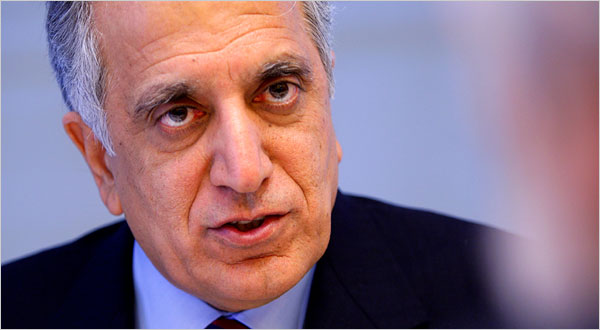Latest News
President’s Visit of China Creates a Long-Term Strategic Conundrum

Last week, Afghanistan’s new President, Ashraf Ghani, traveled to China for his first state visit abroad. Mr. Ghani’s calculation — that Beijing could offset the decline in American and Western support — creates a long-term strategic conundrum: Can Afghanistan attract Chinese investment and security assistance while avoiding the perils of excessive dependency on Beijing?
Mr. Ghani’s outreach to China is driven by a combination of short-term realities and long-term goals. The Western drawdown comes at a time when the Afghan government is neither fiscally self-sufficient nor capable of defeating the Pakistan-backed Taliban insurgency. In the short term, there is little alternative to international assistance to keep the Afghan state afloat.
In the longer term, however, Afghanistan hopes to leverage two of the country’s assets to achieve genuine stability and self-reliance: its natural resources and its strategic location, wedged as it is between Iran, Pakistan, China and the Central Asian states. The development of Afghan infrastructure could turn the country into a regional land bridge. Afghanistan would enjoy unimpeded access to regional and global markets while collecting transit fees from the region’s commercial activity.
Washington’s long-standing support hasn’t been enough to bring the land bridge concept to fruition. Although the United States has spent $4 billion constructing roads, the project requires far more money and political stability. The Asian Development Bank estimates that an additional $2 billion of investments in roads and transmission lines is required — and even more for pipelines, railways and upgrading regional infrastructure. Yet continuing security challenges are diverting attention and resources from the initiative.
China is perhaps the only power with the incentives, resources and national will to make Afghanistan’s ambitious vision a reality. Beijing has already made sizable investments in Afghan copper and oil — including a $3 billion agreement to develop the Aynak copper mine. China is eyeing Afghan natural gas. Western companies, lacking sufficient state backing from their governments, have proven unwilling or unable to make comparable investments. If Beijing were to invest in the country’s infrastructure, new transit corridors would facilitate Chinese trade westward to Iran and the Middle East, and south to the Gwadar port in Pakistan.
Despite the fact that an Afghan land bridge would give Pakistan access to Central Asian markets and products, American pressure alone has not persuaded Islamabad to abandon its support for militants. Pakistan’s civilian leaders are increasingly open to a settlement between the Afghan government and the Taliban. But the overall lack of progress on reconciliation is saddling the United States with the disproportionately large cost of supporting Afghanistan’s security forces.
Pakistani intransigence has strengthened Afghanistan’s case for engagement with China. Since 2001, China has largely stayed on the sidelines as the United States has assumed the heavy lifting on the counterterrorism front. China has pursued its economic interests in Afghanistan while benefiting from the security provided by the American military presence. At the same time, China has maintained friendly relations with Pakistan and has refused to lean on the Pakistani military to change its ways.
Continue reading the main storyContinue reading the main storyContinue reading the main story
Recently, however, there have been signs that Chinese policy is changing. Beijing has indicated that it opposes the Taliban’s return to power and believes that the Taliban’s participation in the political system should be contingent on its renunciation of violence. China has even offered to mediate discussions between Kabul and the Taliban, a sign that it no longer sees its relations with Afghanistan simply as an extension of its ties to Pakistan. Beijing is also promoting the idea of a regional forum for Afghan reconciliation and favors establishing trilateral meetings between China, Afghanistan and the United States.
The Afghan government has so far welcomed Chinese efforts to promote reconciliation. The Taliban’s reaction, which will be influenced by the outcome of talks between Beijing and Islamabad, remains uncertain. Given that China, unlike America, has earned the Pakistani military’s trust over many decades, Beijing is better positioned to bring about a shift in Pakistani policy.
Security interests have been the most important factor in China’s reassessment. Beijing is belatedly coming to terms with the threat Islamic extremists pose to China’s territorial integrity. Terrorists in China’s restive Xinjiang province are training in Pakistani camps and honing military skills through their experience in Afghanistan. China fears that with the American withdrawal, Afghanistan will become a bigger sanctuary for anti-Chinese extremists. The fact that Chinese separatism is becoming a global Islamist cause has not escaped Beijing’s notice; the Islamic State has already vowed to “liberate” Xinjiang.
Economic and security aid from China is not without risks. Afghan institutions may not be strong enough to ensure that Chinese investors meet their contractual obligation to put Afghans to work, meet international environmental and health standards, and protect heritage sites.
And if America’s relations with China deteriorate, Afghanistan might be forced to make a choice. The threat of becoming dependent on China would be particularly acute if the United States were to disengage from Afghanistan. Indeed, during the early years of the Cold War, Afghanistan benefited from the simultaneous infusion of American and Soviet foreign assistance until Washington made a fateful decision to cede the country to Soviet influence.
These concerns are not an argument against expanding ties with China. But they underscore the geopolitical factors at play. Afghanistan must ensure that closer ties to China don’t come at the expense of its partnership with the West.
Washington will have to play its part by participating in the proposed trilateral forum. But it must avoid the temptation to abandon Afghanistan once again and thereby cede wider regional influence to China.
Zalmay Khalilzad was the United States ambassador to Afghanistan, Iraq and the United Nations.

Latest News
Afghanistan now a ‘nexus for diplomatic endeavors’, says IEA

In the wake of dozens of meetings between high-ranking Islamic Emirate officials and visiting officials from foreign countries, and other diplomatic advances, the IEA said on Thursday that in the current geopolitical landscape, Kabul now “serves as a nexus for diplomatic endeavors and political deliberations pertaining to global affairs”.
In a series of posts on X, the IEA’s spokesman Zabihullah Mujahid said diplomatic missions and political delegations from various nations, including Russia, Malaysia, Kazakhstan, Turkmenistan, the European Union, and others, “are evident in the capital, highlighting its strategic importance in fostering Islamic cooperation”.
He said: “Recently, the honorable Minister of Transport of the Islamic Emirate, Mr. Hamidullah Akhundzada, led a significant delegation to Termez, Uzbekistan, for essential discussions aimed at enhancing bilateral relations.
“These discussions encompass a wide range of topics, from trade facilitation to security assurances, indicating a focused effort by the Islamic Emirate to strengthen and broaden its international engagements, thereby ensuring sustained development and stability.
“These initiatives, characterized by diligence and effectiveness, underscore Afghanistan’s enduring commitment to diplomatic engagement and its pivotal role in regional and global affairs,” he said.
Mujahid added that these initiatives “also emphasize the vital connection between diplomatic efforts and economic prosperity, promising favorable outcomes for Afghanistan’s socio-economic landscape.”
He pointed out that despite ongoing challenges, Afghanistan “remains steadfast in its pursuit of prosperity and resilience, defying pessimistic projections and charting a course towards political and economic renewal.”
He said: “Continued efforts are essential to fostering inclusive growth and impactful initiatives, thus advancing Afghanistan’s journey towards sustainable development and increased influence on the global stage.”
Latest News
Mullah Baradar discusses creation of railway with Kazakh deputy PM

Mullah Abdul Ghani Baradar, deputy prime minister for economic affairs has met with Erik Zhumangarin, the Deputy Prime Minister of Kazakhstan, and discussed the establishment of a railway network from Kazakhstan to Pakistan through Turkmenistan and Afghanistan, the deputy PM’s office said in a statement.
During the meeting, Baradar emphasized the need to sign agreements to solve the banking problems of traders from both countries, the creation of Afghan-Kazakh joint companies, and the facilitation of visas for Afghan traders.
According to the statement, the Deputy Prime Minister of Kazakhstan said that the Kazakh government intends to establish a joint chamber of industry and commerce and a joint trade and labor group between the two countries, and is ready to cooperate with Afghanistan in the sectors of e-governance, industry, higher education, education, health, and banking.
Latest News
Iran, Pakistan leaders raise concerns over ‘terrorist groups’ in Afghanistan

Following a two-day official visit to Pakistan, Iranian President Ebrahim Raisi and Pakistan’s Prime Minister Shehbaz Sharif issued a joint statement emphasizing the need to further expand commercial and economic cooperation and transform the common border of the two countries from a “border of peace” to “border of prosperity”.
The two leaders also strongly condemned aggressions and crimes of Israel in Gaza, and demanded an immediate and unconditional ceasefire, as well as unimpeded humanitarian access to the besieged people of Gaza.
Numerous other issues were also discussed but on the topic of Afghanistan, they jointly declared their commitment to the development of Afghanistan as a peaceful, united, independent country free from the threats of terrorism and drug trafficking.
According to the statement the two countries pointed out that the existence of terrorist organizations in Afghanistan is a serious threat to the security of the region and the world.
The two sides stressed their desire to strengthen cooperation in the field of fighting terrorism and ensuring security and creating a united front against terrorism.
They also discussed the importance of coordinating regional and international efforts to ensure security and stability in the region.
“While respecting the sovereignty and territorial integrity of Afghanistan, the two sides recognized that increasing participation of all strata of Afghans in basic decision-making will lead to the strengthening of peace and stability in this country,” the statement read.
-

 Sport5 days ago
Sport5 days agoAfghanistan Champions League kicks off with grand opening ceremony
-

 Latest News4 days ago
Latest News4 days agoPakistan’s frontiers minister stresses ‘dignified’ return of Afghan refugees
-

 Latest News5 days ago
Latest News5 days agoMore than 800 Afghan refugees deported from Pakistan in two days
-

 Regional3 days ago
Regional3 days agoIranian president lands in Pakistan for three-day visit to mend ties
-

 Climate Change4 days ago
Climate Change4 days agoMassive river flooding expected in China, threatening millions
-

 Latest News4 days ago
Latest News4 days agoChinese keen to invest in Panjshir-Kabul water conduit project
-

 World4 days ago
World4 days agoTwo Japan navy helicopters crash, one body found, 7 missing
-

 Latest News5 days ago
Latest News5 days agoIran executes four Afghan prisoners
















